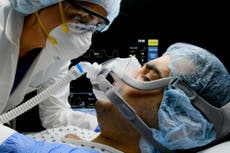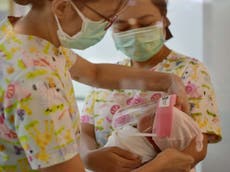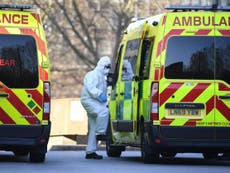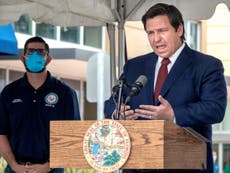If you want to know the scary truth about frontline medical workers during coronavirus, don't ask doctors. Ask people like me
The people who last in these kinds of roles during this pandemic are the people you don't want caring for your community members: They're people who don't care

I'm drinking Pedialyte as I write this. Not because I'm a toddler, or hungover; because I'm a healthcare worker during the time of Covid-19. I have no time to even take a sip of water during the day and I'm not allowed to call out if I get sick from dehydration. This is not how you want healthcare workers serving you, your family and your community during a pandemic.
I got into social work because I wanted to help people. It certainly wasn't for the money. I've been a case manager in various capacities for almost 10 years now. Most of it has been spent working as a case manager for people experiencing homelessness.
The culture of these kinds of workplaces and of this type of work is not foreign to me. I've had clients get violent with me, threaten me, threaten others, threaten themselves and all to get paid $16 an hour because capitalism dictates this kind of labor is less valuable than, say, a doctor or a biomedical engineer. Recently, I got a new job as a medical case manager for people living with HIV.
I got this job right before coronavirus hit America hard — only a day or two before the WHO declared a pandemic. The treatment myself and my colleagues have endured during this crisis is appalling. I've read a few stories of nurses and primarily doctors, but let me tell you, doctors are at the top of the clinic or hospital hierarchy. As awful as the treatment of them can be during this time, just imagine how those of us in the middle or the bottom of the healthcare hierarchy are being treated: social workers, case managers, nurses, medical receptionists, cleanup crews, and so on.
As a medical case manager for people living with HIV, my job is extremely important. The majority of patients that I work with are low-income, African-born immigrants and refugees, or people who are homeless, living with multiple mental health disabilities, and not on medications — with some of them even having their HIV advance to AIDS as a result. This is not to say this is generally the “profile” of someone with HIV, but rather, since our clinic is specifically for low-income people, these are the vulnerable populations we specialize in serving.
The agency that I work for is a set of five separate low-income clinics in the Seattle area, in which the majority of our patients are on Medicaid. I am the only case manager or social worker in the entire five clinics and have over 500 patients on my caseload, over 75 percent of whom live below the federal poverty level. The National Institutes of Health has correlated poverty to poorer health outcomes for people living with HIV due to such poverty-related problems as transportation issues, lack of access to food, and unstable housing, all of which the NIH found directly contributes to patients being less likely to attend regular HIV care visits and adhere to medication regimens.
I risk my life every day — and gladly do so — because I understand that there are some people for whom remote case management is not possible precisely because they don't have a phone, they don't have a computer, they don't have internet access, they don't even have a place to sleep at night besides a doorway or sidewalk. I'm not asking to be able to work from home — my patients need me in the office, and I believe it's important someone shows up for the most marginalized and forgotten. I'm merely asking to be allowed time to go to the bathroom, to drink some water, and to be able to call out if I'm legitimately ill, without fear of reprisal.
A few weeks ago, I had to call in twice (two separate days) for throwing up. It was so bad that on the second day I couldn't eat any solid foods for five days and was barely able to take liquids. I only took one day at home and worked the other four days, when I wasn't even able to eat. Last week, I got written up for “calling out sick” during an international health crisis.
On the second day I had to leave early due to vomiting. I was told that I must work at least five hours to get paid. Therefore, on the day I left at noon, I didn't get paid for any of the time that I worked, which clocked in as just under five hours.
Additionally, I recently was referred to a cardiologist for potentially serious heart abnormalities and high blood pressure. I'm 34 years old. I'm terrified to ask for the two hours off to be able to see my cardiologist and know that it may come down to choosing between enforcing boundaries with my workplace and taking care of myself or dying for my job. None of this should be happening.
If I'm falling over dying with a cough, fever, vomiting, or indeed any combination of any symptoms, I'm expected to still come into work — and not to get anyone else sick in the process. There is zero compassion extended to us as frontline workers. The message remains: Serve the public. Make us money. Don't cause trouble. That last part especially. Keep the enterprise afloat through personal sacrifice.
I feel like my humanity is completely disregarded by my employers. If I were to give the slightest pushback to any of this treatment, I'd be gone. And they know that I know that. It's a time where people are getting kicked out of their homes and calling unemployment hundreds of times in a week. If I won't toe the line, someone else will be glad to in this free-falling economy.
So the question is: Why should you care? You may not be living with HIV; you may not be homeless or in dire poverty. But the staunchest lesson for people who “have” during the time of coronavirus is that we all are only as healthy as our sickest person. This is not a Democrat notion or a Republican notion. It's not a matter of politics. It's scientific truth.
The American healthcare system isn't broken, because it was never designed to help people to begin with. It was designed to make the wealthiest even wealthier, and to punish people without wealth by allowing them to die for being poor. To be honest, I give myself a year, tops, in this role. Not because I don't love my work — it's actually my dream job — but because of the poor treatment and working conditions. The people who last in these kinds of roles during this pandemic are the people you don't want caring for your community members: They're people who don't care; people who aren't affected by the body of work because they are simply not emotionally concerned about the patients they serve to begin with.
Let me tell you, my friend, as someone who’s working on the front line right now: When it comes down to the ethical treatment of humans or money, money wins every time in the good ol' U-S of A.
Sara Devereux is a pseudonym





Join our commenting forum
Join thought-provoking conversations, follow other Independent readers and see their replies